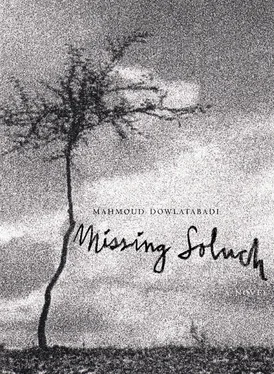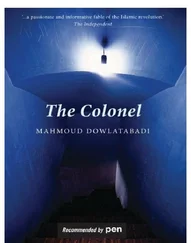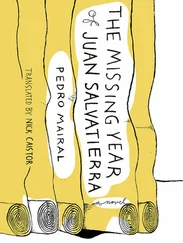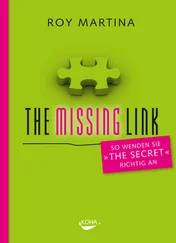“No doubt you’ll have to get your compensation from God himself. You simple woman! Landless people go out to these rough lands, pick a bit at it with a shovel, plant on it for a year, and then leave it in the hands of God. Very few people have chosen a plot for themselves. Usually they go once a year, plant a few seeds, and then leave the village for work. Later, they gather a small harvest off the land, and if they didn’t, the wind would simply blow the seeds. That’s why there’s no accounting or ownership. It’s constant work, planting, ploughing, harvesting, that gives someone ownership of land. Open, unused land has no owners, since there are no plots on it. No one works the land, and so the owner will be whoever has the strength to take it. Whoever speaks more cleverly, who has more in his pocket. What they’re saying is that from the valley on one side of the land, to the edge of the sands of the desert, they want to plant pistachios in a field of one farsakh by three farsakhs . That’s what they’re dreaming of. They want to bring in a water pump and to smooth out the land there. The ministry of agriculture will give loans for these kinds of projects. In any case, what I’m saying is that to keep your plot, you need to be sure to keep working it. If possible, you should outline the borders of the plot. From what I hear, Salar Abdullah, Zabihollah, and a few others are doing the work on this. Kadkhoda Norouz also has a hand in it. They need to come to agreement with a handful of the landless here, one of them being you. I don’t have high expectations of the others. People like the sons of Sanam. And like Ghodrat, the son of that thief. And a poor and motley group of others, just like them.”
Mergan said, “I’ll take my shovel out on the first day and go to the land. They want to register it? Ha! What about all the work we’ve done to pull out the thorny weeds one by one, and to smooth the land so it’s like the palm of my hand? I have to feed my children during the summer from the fruits of this land.”
“That’s exactly what I’m saying. Soluch was the first to think of doing something with these forsaken lands. I remember seven years back, it was after he had begun to work there that others also started to as well. For example, I myself have only been planting there for two years.”
They had now reached the mosque. The Molla of Zaminej was sitting on the broken wall. Ali Genav told him that the grave was ready. The Molla rose and entered the mosque. Hajj Salem had stopped his recitation and was now napping beside the casket. Moslem was awake and was playing with bits and pieces he had gathered from the floor of the mosque. Hajj Salem’s head was resting on the casket. Morad was also there, standing silently by the pillar in the night-prayers niche, like a shadow. The Molla went and asked them to help raise the coffin. Morad came over. Hajj Salem jolted awake, picked himself up, and placed the tattered Qur’an of the mosque onto the bookshelf, mumbling something under his breath, something like, “There’s no strength and no ability without God!”
The Molla of Zaminej looked at Ali Genav, who strode over to the casket. Hajj Salem tapped Moslem with his cane and gestured at him to help before taking one corner of the coffin in his hands. They took the coffin into the courtyard of the mosque. The front of the coffin was held by Mergan and Ali Genav, and the back was held by Moslem and Morad. The Molla of Zaminej and Hajj Salem were walking behind the coffin, praying and reciting as they walked.
The cold, silent coffin traversed the empty alleys to its grave. The cold had entered the marrow of their bones. There was no sun. The snow broke beneath their steps. Outside the village, the coldness was even sharper.
They passed the edge of a stream just before reaching the graveyard.
A cold wind was blowing. Ghodrat’s father was standing over the grave leaning on his shovel, his cloak’s edges flapping in the wind. Ghodrat was with him, sitting by the gravestone of Ali Genav’s father. When he saw the casket, he rose and walked forward along with his father, who resembled a broken twig.
Before they reached the group, Ghodrat’s father said, “We’d come to lend a hand, Ali!”
“God give you life. There wasn’t much to do.”
Ghodrat took Mergan’s place under the coffin, and his father put a finger on its side and said, “There’s no God but God himself!”
The water in the stream gave off a pleasant steam in the coldness of the dawn. The water was not very warm, but it was warm enough. They set the casket down beside the running water. The men stood around and Mergan rolled up her sleeves and the bottoms of her pants legs. Ali Genav diverted the stream with a few shovels full of dirt and stones, so as to prevent the water from the corpse-washing from going downstream to the fields. The men turned their backs and sat farther down on the banks of the stream. Mergan and Ali Genav took the corpse out of the casket and set it flat on the stones. She instructed him to fetch the half-broken jug that was submerged in the stream, which he did. Mergan began to remove the shroud and told Ali Genav that there was nothing more for him to do. He joined the other men and sat with his back to the corpse. Sitting beside the Molla, he lit a cigarette.
“Death is truth, my son!”
So as to not be outdone by Hajj Salem, the village Molla said, “And inheritance is just!”
Ali Genav half-smiled as he said, “How am I to repay you for this? Here! Have a smoke. Take one each. You, too, father of Ghodrat. What? You want one, Moslem? Here! One for you as well!”
The village Molla told Moslem, “Don’t look over there, my son!”
Hajj Salem rebuked his son, “You ass! Put your head down!”
Then he looked at Molla of Zaminej and said, “What may we ask God for, Molla?”
It wasn’t always necessary for Mergan to have been trained in something for her to know how to do it. It was often good enough for her to have simply seen it done once. So, there was almost nothing that she could not do. She never was afraid of working, although she had no illusions about it. She never ran from it. Her steadfastness, and her hatred for avoiding work, gave her a strength and a confidence to take on any kind of task. To carry out the ritual of cleansing a corpse — fine! That’s not a difficult job. She could also cut an umbilical cord. She had bitten off the umbilical cord of Abrau with her own teeth. The birth was unexpected, at the break of dawn. Before anyone could be roused to assist her, she had already cut the child’s cord and had tied it. She did it all, from labor to birth. Now, she replaced Mother Genav’s shroud and tied it. Ali Genav came over and they put the corpse back into the casket.
The Molla of Zaminej rose. Hajj Salem was helped by Moslem. They raised the casket on their shoulders again and took it to the grave. Mergan also took on the task of fitting the body in the grave. But first they had to say the funerary prayer. The men took their places behind the Molla, despite Hajj Salem’s desire to do otherwise. Ali Genav didn’t know how to pray, and neither did Morad. Most of them simply moved their lips while Ali Genav wagged his loosely. He was too tired and impatient to take the task to heart. Before the prayer was done, he stepped to one side. Once the prayer was over, he went toward the coffin. Mergan joined him. Mother Genav was not very heavy; in fact, she was light like hay. With two quick motions, she was brought out of the casket and placed into the grave. Mergan came out of the grave. Ali Genav picked up his shovel. Ghodrat’s father also helped. Mergan, Morad, and Ghodrat all used their hands to push the dirt into the grave. It had to be filled to the surface. Hajj Salem and the Molla both withdrew from the graveside. Moslem stood at the edge of the grave looking, with his bulging eyes and an air of confusion, at the body slowly being covered. The filling of the grave was finished before anyone’s forehead was covered by sweat. There was no water on hand. Mergan took the shovel from Ali Genav, filled it with snow a few times, and poured it over the grave, tapping it with the implement. Now their work was done. Ali Genav took a deep breath. A burden was taken off his shoulders. Now he could relax. He filled his lungs with the clean morning air, put his cloak on his shoulders, took his shovel, and followed the others as they left.
Читать дальше












